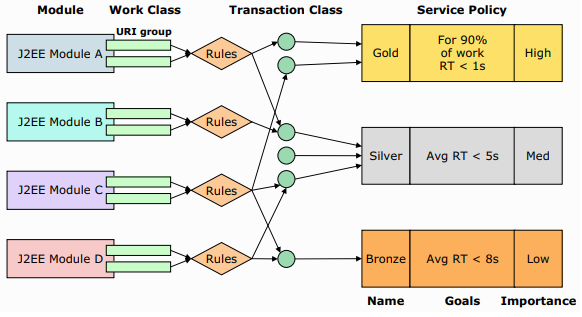Overview of work classes
A work class is a grouping of work to be done by an application server. Work is an HTTP request, a SIP message, an IIOP call, or a JMS message. Each work class contains a set of rules used by Intelligent Management to determine how to handle that work.
Work class overview
A work class is used to classify requests to apply a policy to the request.

There are two main types of work classes:
- Service policy work classes - Associate incoming work with a service policy.
- Routing policy work classes - Associate incoming work with a routing policy.
Each unit of work (request, message, or call) is associated with a single service policy work class. HTTP requests and SIP messages are also associated with a single routing work class. Routing work classes do not exist for IIOP and JMS because these protocols do not flow through the on demand router; thus no routing policy is needed.
The following diagram shows the flow of a request targeted for an application installed in the Intelligent Management environment. The request is applied to an application routing policy work class to determine the routing policy. If the resulting routing policy is permit or permitsticky, the request continues to an application service policy work class to determine the service policy and the transaction class name.

Each application contains default application routing and application service policy work classes. We can also create additional non-default work classes. Each work class has a default match action. The default routing policy for an application is permit:application_name. The default service policy is Default_TC, the default transaction class.
Create a work class
A work class is applied to the patterns associated with it. Every pattern has an object (application module or on demand router) with which it is associated. These pattern and object pairs make up the definition of which requests the work class is mapped to. Custom work class defined patterns take precedent over the default work class patterns. Every default work class contains a "/*" pattern, which means every request matches for that object.
Custom work class definitions are evaluated before default work class definitions when trying to find the matching definition. If an incoming request cannot be matched by any custom work class definitions, the default work class definition is used.
Work class types
There are different types of work classes for service and routing policies:
| Work class | Description |
|---|---|
| Application routing policy | Specifies how to determine the routing policy for a request to an application installed in the Intelligent Management environment. |
| Application service policy | Specifies how to determine the service policy for a request to an application installed in the Intelligent Management environment. |
| Generic server cluster routing policy | Specifies how to determine the routing policy for a request to a generic server cluster. |
| Generic server cluster service policy | Specifies how to determine the service policy for a request to a generic server cluster. |
Related: